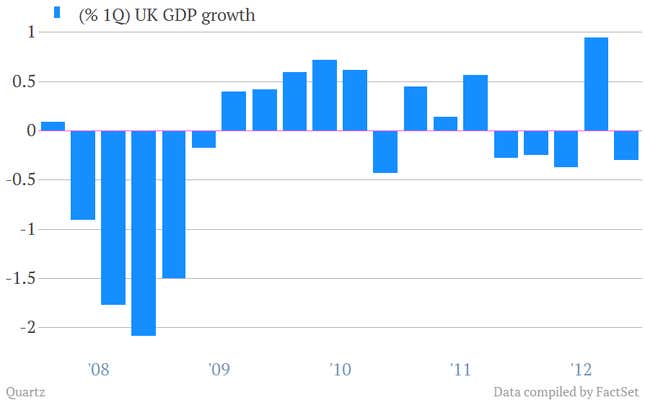
The UK is hurting something awful, we all know now. Behind the unexpectedly sharp 0.3% decline in the UK’s fourth-quarter GDP were withering factory output, a North Sea oil production slowdown and post-Olympics doldrums, reports Reuters. And the outlook’s not good: The term “triple-dip” is now being bandied around. Have a look:

Coming on the heels of Q4 contractions in both Spain and Germany, the news out of London invites some pointed questions about whether the austerity policies Britain has assiduously followed are good for economic recovery.
Of course, the International Monetary Fund (IMF) already raised many of these last October. But yesterday, its chief economist, Olivier Blanchard, stepped up the rhetoric, again urging George Osborne, Britain’s finance minister, to make a “reassessment of fiscal policy.” That came, by the way, just after the IMF downgraded its UK growth forecast to just 1% for 2013. ”We’ve never been passionate about austerity,” Blanchard told the BBC yesterday. “From the beginning we have always emphasized that fiscal consolidation should be slow and steady.”
But Osborne’s not having it: The Guardian reports that he will push forward with austerity plans regardless. And that’s despite having already acknowledged back in December that the UK wouldn’t hit his goal of cutting the the British debt level as a share of economic output by 2015-16.
Now some of the big ratings agencies are considering downgrading the AAA credit rating on UK debt—something that would be a blow to Osborne, argues the New Statesman, given how much stock he has historically put in that measure. Ironically, though, the issue at hand isn’t the debt-cutting so much as the UK’s economic health. “The UK has very little headroom for fiscal shocks,” Fitch told The Telegraph in mid-January, adding a blow to the country’s credibility would come from a backslide in economic growth. One wonders if -0.3% counts.



